HIStalk’s Must See Vendors for MGMA 2013
Here is our list of some of the hottest exhibitors this year, all of whom happen to be faithful HIStalk sponsors. Also included: contact information for a few of sponsors who will not be exhibiting but will be at MGMA and happy to schedule one-on-one meetings.
ADP AdvancedMD
Booth 525
ADP AdvancedMD is a leader in all-in-one, cloud electronic health record (EHR), practice management, and medical scheduling software as well as medical billing services. With AdvancedMD you can leave behind five or more systems with our all-in-one EHR and practice management solution that allows you to optimize schedules, simplify check-in and checkout, document patient encounters, prescribe and order, capture and pursue revenue, measure financial performance, and practice on the go. AdvancedMD simply makes running your practice easier.
Come see us at booth #525 where we will be unveiling and demo’ing our newest mobility app and advanced reporting analytics designed for the private practice that is easy to use and affordable.
Visit us online at www.advancedmd or on Twitter @adpadvancedmd.
Allscripts
Booth 915
Visit Allscripts in booth 915 to learn what you need to know about Population Health, Financial Viability, MU, ICD-10, and other changes in the healthcare landscape.
Booth presentations include:
- Sunday, October 6, 5 and 5:30 p.m.: Population Health Overview
- Sunday, October 6, 4:30-6:30 p.m.: FollowMyHealth™ Patient Portal Presentation Demos
- Monday, October 7, 12:30-1:30 p.m.: Top 11 Imperatives for Your Revenue Cycle presented by Owen Dahl, Industry Consultant and MGMA Contributor, followed by raffle and signing of his book, “Think Business! Medical Practice Quality, Efficiency, Profits.”
- Tuesday, October 8, 11:30 a.m.-1:30 p.m.: Practice Performance Analytics Presentation Demos
Aprima Medical Software
Booth 1007
Aprima provides innovative electronic health record, practice management and revenue cycle management solutions for medical practices. The Aprima EHR/PM is an integrated system built on a single database. Aprima uses a fast, flexible design that adapts automatically to a physician’s workflow and sets the benchmark for ease of use, speed and flexibility.
Aprima is one of the few companies with a 15-year track record of success, including Certification for Meaningful Use Stage 2 in 2013. To learn more about the details of this and other certifications, visit http://aprima.com/company/industry-recognition/.
Thousands of Aprima users are benefiting from improved quality of care, improved patient satisfaction, improved quality of life and an improved bottom line. Based in Carrollton, TX, Aprima performs all development, support, and implementation from the U.S.
To learn more about how Aprima can help your practice, please visit www.aprima.com, call us at 866-960-6890, option 7, or email us at info@aprima.com.
AT&T
Booth 321
AT&T ForHealth℠ is committed to serving the technology needs across the continuum of care from hospitals to physicians to patients. Our suite of innovative wireless, cloud-based services and applications empower clinicians by placing vital patient information at their fingertips. Medical images are stored and shared through the cloud. Telehealth allows patients greater access to specialty care. And mobile health solutions help patients be more engaged in their own care.
AT&T believes the use of mobile technologies and smart networks can help create a healthier world.
Beacon Partners
To schedule a meeting: Chris Kalish, ckalish@beaconpartners.com
Beacon Partners will be attending the MGMA Annual Conference in San Diego!
As one of the largest healthcare consulting firms in North America, Beacon Partners helps healthcare organizations improve their operational, clinical, and financial performance. Our strategic advisory and system implementation services provide our clients guidance and support to achieve organizational goals including EHR and full HIS, ACO readiness, ICD-10 strategy, Meaningful Use strategy and implementation, Analytics strategy and implementation, Enterprise Information Assurance, and more.
We are healthcare professionals just like you. That’s the Beacon Partners difference.
Capario
Booth 1231
Capario is the only name you need to know to manage your entire revenue cycle, from patient check-in to payment posting. Check eligibility in real time, submit and track claims, manage rejections and denials, and take patient payments in the office, online or over the phone, all with a single solution.
Stop by the booth to watch a demo and win a chance to receive a GoPro Hero 3. One GoPro will be given away each day.
Culbert Healthcare Solutions
Booth 1121
Culbert provides high value, professional services focused on improving clinical, operational and revenue cycle performance and the overall patient experience. Our experienced healthcare professionals help group practices and hospitals optimize technology and navigate the change management process
Direct Recruiters, Inc.
To schedule a meeting: Email msilverstein@directrecruiters.com
Direct Recruiters, Inc. is a leading executive search and consulting firm dedicated to helping top Healthcare IT vendors enhance their performance and fill talent needs. Our Healthcare IT team members will be walking the show floor this year and would love the opportunity to chat about the value we provide to vendors.
We provide top talent for all client-facing roles from direct contributors to C-level positions. We don’t just provide people, we provide solutions.
For more information, email msilverstein@directrecruiters.com or visit http://www.directrecruiters.com.
eClinicalWorks
Booth 831
eClinicalWorks is a leader in healthcare IT solutions, including electronic health records, population health and patient engagement tools. With more than 236,000 medical providers and 472,000 healthcare professionals across all 50 states using its solutions, customers include physician practices, Patient-Centered Medical Homes, ACOs, university student health services, athletic organizations, out-patient departments of hospitals, health centers, and convenient care clinics.
Stop by our booth to learn about new developments, have your questions answered, and see live demos.
DrFirst
Booth 1931
DrFirst pioneers software solutions and services designed to optimize healthcare provider access to patient information, improve the doctor’s clinical view of the patient at the time of care, and enable more effective, efficient administration and collaboration across a patient’s circle of caregivers.
Our growth is driven by a commitment to innovation and reliability across a wide array of service areas, including Medication History and e-Prescribing, Secure Messaging and Clinical Data Sharing, and Patient Behavioral Education and Medication Adherence.
We are proud of our track record of service to 40,000 providers and over 290+ EMR/EHR/HIS vendors nationwide.
Elsevier
Booths 314/316
Elsevier, the leader in medical and clinical information, is a trusted partner to health care professionals and institutions. With evidence-based content and a suite of clinical decision support tools including order sets, care planning, performance management, and patient education solutions, Elsevier is dedicated to helping you drive meaningful care today and position your organization for sustainable success.
Emdeon
Booth 731
Stop by booth 731 to play Emdeon’s high-adrenaline, deceptively tricky game Cash Stacker coming to this year’s MGMA 2013 Annual Conference.
While you’re there, discover how Emdeon can help you achieve the financial, clinical and patient outcomes needed to help keep your practice financially sound, regardless of the changes you face in your practice today.
Be sure to attend our in-booth speaking sessions to learn how we can help you thrive in the uncertainty driven by healthcare reform. Oh, and while you’re there, play Cash Stacker and enter for a chance to win big!
e-MDs, Inc.
Booth 225
e-MDs is a leading developer of integrated electronic health records and practice management software for physician practices and enterprises. Founded and actively managed by physicians, the company is an industry leader for usable, connected software that enables physician productivity and a superior clinical experience.
e-MDs software has received continual top rankings in physician and industry surveys including those conducted by the American Academy of Family Physicians’ Family Practice Management, KLAS®, AmericanEHR™ Partners, MedScape®, and Black Book®. e-MDs has a proven track record of positioning clients for success as demonstrated by Meaningful Use attainment in 2011-2012. According to data provided by CMS, e-MDs clients are attesting in the top proportion of all major vendors.
For more information, please visit http://www.e-mds.com, http://facebook.e-mds.com, and https://twitter.com/emds.
Forward Health Group, Inc.
MGMA’s Data Experience area (near registration)
The power of partnership. Making the shift to a value-based health care environment requires the right guides. The good news is that MGMA and Forward Health Group have partnered to provide you with the tools you need to successfully make the shift and thrive in the new environment.
With best-in-class data harvesting, collection, validation and alignment, Forward Health Group can deliver what others can’t. We can drive meaningful and measurable improvements in the metrics most important to you, the metrics critical for success in the new healthcare arena.
John Studebaker, MD, MS, Forward Health Group’s CMIO, will deliver the opening presentation of The Data Experience at 9:45 AM on Monday, 10/7 – “What’s All This About Population Health Management?” Also, David Howes, MD, CEO of Martin’s Point Health Care (a user of Forward Health Group’s PopulationManager®), will speak at 2 PM on Monday, Use of Registry Tools to Improve Care.
Visit www.mgma.forwardhealthgroup.com for more information.
Gateway EDI, a TriZetto Company
Booth 1015
More than 200,000 providers trust the proactive Gateway EDI, a TriZetto Company, team and advanced claims processing solutions to simplify revenue management. We help practices maximize revenue by securing accurate reimbursements, decreasing claims rejections and improving payment turnaround times.
During MGMA Annual Conference, help raise breast cancer awareness and join the search for a cure by swiping your badge at the Gateway EDI booth. For every swipe, Gateway EDI will donate $5 to the San Diego affiliate of Susan G. Komen for the Cure®.
While you’re visiting, create a fun souvenir of your trip in our photo booth, or record a video testimonial that could end up on our Facebook page. We can’t wait to see you in October.
Learn more about Gateway EDI at www.trizetto.com/provider.
GetWellNetwork
To schedule a meeting: Tony Cook tcook@getwellnetwork.com
Our patient-centered platform uses mobile devices, computers and televisions to enable providers to implement an Interactive Patient Care™ delivery model that improves performance and patient outcomes.
Greenway Medical Technologies
Booth 1627
Stop by Greenway booth 1627 at the MGMA 2013 Annual Conference to learn how our fully integrated, technologically advanced solutions can increase your productivity, improve care coordination, optimize revenue and more.
A few of the benefits of Greenway’s platform are:
- Fully integrated EHR/PM solution, PrimeSUITE®, decreases duplicate data entry
- Clinically driven revenue cycle management™, PrimeRCM®, ensures you get paid, faster and better
- Flexible interoperability engine, enabling seamless data exchange between your organization, hospitals, labs, practices, HIEs, and the entire community
- Clinical template library with approximately 4,000 templates that can be customized to meet your needs
- A secure network that allows you to access patient files remotely — anytime, anywhere
- And more…
Enter to win a Titleist golf bag autographed by PGA TOUR Pro Jason Dufner
Iatric Systems, Inc.
Booth 939
Comprehensive Healthcare IT Integration
- Interfaces and System Integration
- Medical Device Integration
- Meaningful Use Tracking and Reporting
- Patient Privacy Monitoring
Come by our booth for a chance to win an iPad mini!!!
IMO – Intelligent Medical Objects
Booth 1039
Intelligent Medical Objects (IMO®) is the market leader in terminology services for EHRs. IMO’s Problem (IT) Terminology database includes over 260,000 terms expressing clinical intent, enabling clinicians to find diagnoses and procedures in terms they are familiar with. IMO then provides seamless mapping of diagnostic terminologies to billing codes and medical concepts, improving accuracy and efficiency. IMO’s terminology services ease the transition to ICD-10 and support attestation for MU2.
More at www.e-imo.com.
Ingenious Med Inc.
Booth 315
Founded in 1999 by practicing physicians, Ingenious Med strives to put physicians’ time and attention where it’s needed most: with their patients. We achieve this by offering solutions that improve productivity and efficiency, maximize revenue, increase billing accuracy, ensure compliance, and improve quality of care, all of which are designed with interoperability in mind.
Our three product categories, impower, imagine, and impact, each support different aspects of productivity and quality of care, coming together as the complete physician rounding platform.
Ingenious Med will be drawing winners for Apple TVs both days of the conference as well as at our client event, Monday, October 7 from 6-9pm at JSix Restaurant.
Lifepoint Informatics
Booth 1045
Interfacing your EMR to unlimited laboratory systems is required to achieve successful patient outcomes. As healthcare gets more complex, doctors need to work with multiple labs to provide the best in patient care. Insurance rules, newer genetic testing, smaller test menus and physician preference are all factors driving this trend. The large national labs (Quest Diagnostics and Labcorp) represent only 23% of the outpatient testing market. Due to insurance rules and physician choice, providers need to access regional reference labs, local pathology groups and community hospital outreach labs. LabHub helps these providers engage with multiple labs while simultaneously eliminating the need for separate results systems from each laboratory.
Contact us for more information. www.lifepoint.com
McKesson
Booth 1215
McKesson Business Performance Services is an experienced provider of healthcare management, medical billing and technology services for hospitals, health systems, physicians, and other valued healthcare stakeholders nationwide. We offer a comprehensive portfolio of revenue cycle solutions, practice management services, and advanced technology to help our clients achieve better business health.
MedAssets
Booth 1414
MedAssets offers a full spectrum of technology-enabled services designed to fundamentally transform supply and resource utilization processes. We currently help more than 4,200 hospitals and 122,000 non-acute healthcare providers realize sustainable performance improvement that is typically unattainable through more traditional business models.
Through our Physician Services, program we provide primary care and sub-specialty practices with the ability to purchase high-quality products and services at lower costs than they would be able to negotiate on their own. Medical practices utilizing the MedAssets Physician Services program can reduce supply expense by 5 to 10 percent through our comprehensive, national contract portfolio, which covers 1,800 contracts across top product categories. www.medassets.com
Optum
Booth 231
Optum delivers an array of capabilities to meet the most demanding challenges of physician practices. With in-depth provider expertise and knowledge providers are able to navigate compliance, reimbursement and reform requirements that span the health care system.
Providers are invited to visit the Optum booth #231 to learn more about how to maximize their financial performance, increase quality and patient satisfaction while lowering cost.
Also, participate in the ICD-10 Top Challenges survey at the booth and enter to win an iPad!
Passport Health Communications
Booth 201
Passport Health Communications Inc. provides software and solutions to help hospitals and health care providers improve business operations and secure payment for their services. Passport serves more than 2,500+ hospitals in addition to more than 9,000+ physicians, clinics and ancillary offices across all 50 states and processes more than 400+ million transactions annually through its Passport eCare® brand of patient access and payment certainty solutions for the revenue cycle.
Stop by booth 201 to schedule an eCare NEXT demo and be automatically entered to win an iPad mini!
PatientKeeper
Booth 603
PatientKeeper® is a leading provider of healthcare applications for physicians, and KLAS® Research’s 2012 Category Leader in “Clinical Portals/Aggregation.”
PatientKeeper helps physicians stay focused on job #1 by offering a range of innovative and intuitive software applications:
- available on Web-connected computers and as a native mobile app
- to expedite the financial, documentation and communications tasks that are part of their day.
For more than a decade, PatientKeeper Charge Capture™ has been the automated billing workflow solution that easily fits a clinician’s work style, enabling them to record charges for services they deliver, quickly and easily – at the point of care, in the office, or anywhere in between.
PatientKeeper’s software integrates with existing healthcare information systems to create the most effective solution for driving physician adoption of technology, meeting Meaningful Use, and transitioning to ICD-10. PatientKeeper has more than 50,000 active physician users today.
PatientPay
To schedule a meeting: Email tf@patientpay.com or call 919.697.1189
PatientPay is the innovative solution to the costly and complex challenge faced by healthcare providers managing and processing patient balances. It is the easiest application to integrate in your service so you and your practices can begin to realize greater profits.
Quest Diagnostics
Booth 2104
As the world’s leading provider of diagnostic information services, Quest Diagnostics’ vision is to empower better health with diagnostic insights. Our leadership in health information technology and quality Lab-EHR interoperability through our Health IT Quality Solutions™ (HITQS) Program plays a large role in bringing that vision to life.
As a proud sponsor of MGMA13, we congratulate the EHR products exhibiting at the conference that have been certified as Quality Solutions by our HITQS Program. Their Quality Solutions certification demonstrates their commitment to quality Lab-EHR interoperability.
Visit our booth 2104 for a list of these Quality Solutions EHR Vendors and register for a chance to win a Kindle Fire HD tablet computer.
Sandlot Solutions
Booth 1044
Sandlot Solutions is a healthcare IT company focused on fourth-generation health information exchange plus data analytics and care management. Sandlot builds the connection for any organization exchanging healthcare information to improve the quality of care, manage risk and reduce costs.
The company’s configurable technology streamlines data-sharing. Physicians receive digital envelopes within their workflow with actionable patient information and analytics, including prompts at the point of care for appropriate interventions, education and follow-up.
Stop by Sandlot’s Booth, #1044, to learn more and a chance to win an iPad. There are two different drawings, one for Clinicians and another for Administrators & Staff — bring your business card to enter.
SRSsoft
Booth 425
SRS is the recognized leader in productivity-enhancing EHR and healthcare IT solutions for specialists—with unparalleled adoption rates. Offered via the Unified Desktop™, SRS EHR, PM, Integrated PACS, Patient Portal, and Transcription increase speed, boost revenue, free physicians’ time, and enhance patient care and satisfaction.
Contact SRS: info@srssoft.com, 800.288.8369, or www.srssoft.com. Be sure to stop by our booth and enter for a chance to win a Kindle Fire HD!
SuccessEHS
Booth 1608
SuccessEHS is a nationally acclaimed vendor providing a single solution Practice Management and Electronic Health Record with Integrated Medical Billing Services, as well as an Electronic Dental Record (EDR). Providers in more than 65 specialties across 47 states, Puerto Rico and the Virgin Islands use the SuccessEHS solution, including more than 190 Community Health Centers (CHCs). SuccessEHS software solutions are entirely in-house developed and supported.
For more information and a free demonstration, visit SuccessEHS at Booth #1608.
Versus Technology
Booth 1902
Do you want to improve patient satisfaction while reducing overall patient visit times? Do you want to double patient volume without doubling staff? Do you want to increase revenue by $1 million in 6 months?
That’s what some of our clients have achieved using the Versus Advantages™ Clinic Real-time Locating System (RTLS). Find out how clinics like Virginia Mason Kirkland use Versus’ RTLS to support lean management and automate operations. Our accurate, real-time location information is proven to improve workflow by tracking patient visits automatically, with no manual data entry. The RTLS and patient flow software can stand alone or integrate to your practice management system or EMR, producing accurate, timely metrics that reveal bottlenecks.
See us at Booth #1902 for a personal demonstration and register to win a Microsoft Surface, or visit versustech.com/clinics to download our educational RTLS white paper.
Vitera Healthcare Solutions
Booth 1815
Visit Booth #1815 to see how Vitera and our solutions can help you navigate the ever-changing tide of healthcare:
- Watch a demo of Vitera Intergy v9.00 — exactly what you need to meet all the requirements for Meaningful Use Stage 2 and ICD-10.
- Listen to MGMA consultant and ICD-10 coding expert Nancy Enos provide tips on how to make your transition to ICD-10 smooth sailing.
- Register for a daily giveaway of a mini-tablet!
See you at the MGMA 2013 Annual Conference!
Wolters Kluwer Health
Booth 2123
Wolters Kluwer Health, a leading global provider of information, business intelligence and point-of-care solutions for the healthcare industry, is featuring three of its leading brands during MGMA.
- UpToDate (www.uptodate.com) is an evidence-based, physician-authored clinical knowledge system that clinicians trust to make the right point-of-care decisions.
- Lexicomp (www.lexi.com) delivers a wide range of drug information and CDS tools that help enhance decision-making, increase efficiency and improve patient outcomes.
- Medi-Span (www.medispan.com) provides authoritative, embedded drug information databases, medication decision support and disease suite modules for healthcare information systems worldwide.
ZirMed
Booth 607
Come by and visit our booth #607 during the opening reception.
Monday, October 6th 4:30 – 6:30pm: We will be serving Baja street tacos, Mexican Garden salad, mini tamales, empanadas, and grilled chicken empanadas.
Also, sign up for a chance to win an iPad mini!



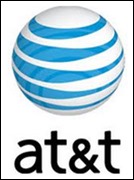
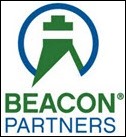




















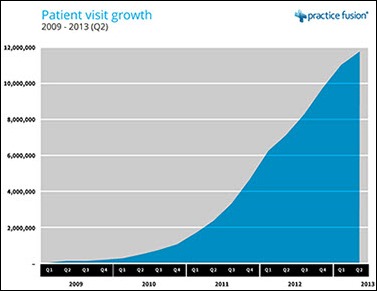
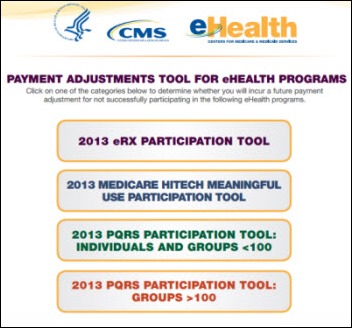
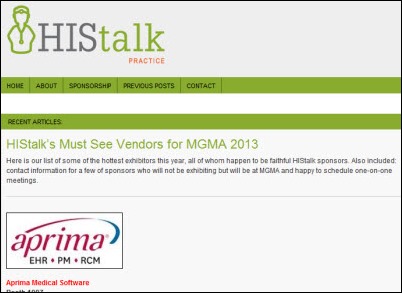







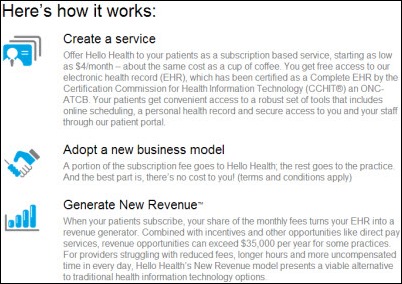
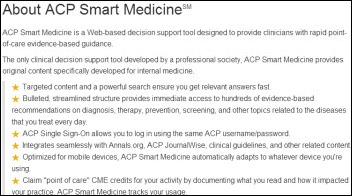
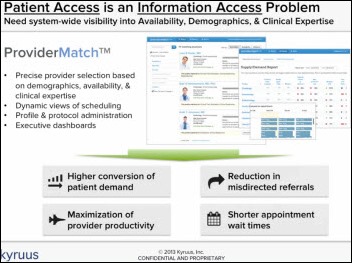
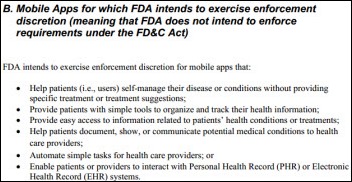

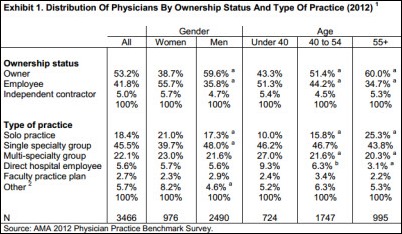
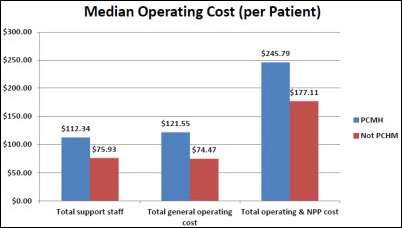

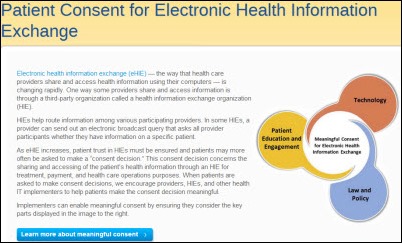
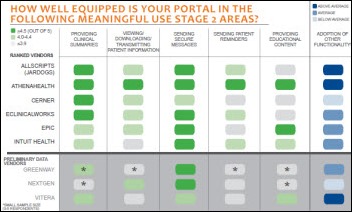
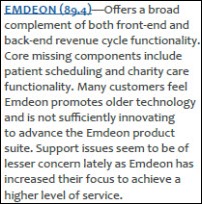
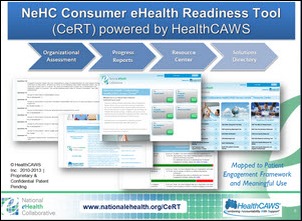
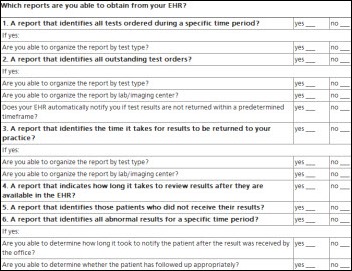
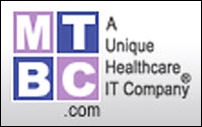

The article about Pediatric Associates in CA has a nugget with a potentially outsized impact: the implication that VFC vaccines…